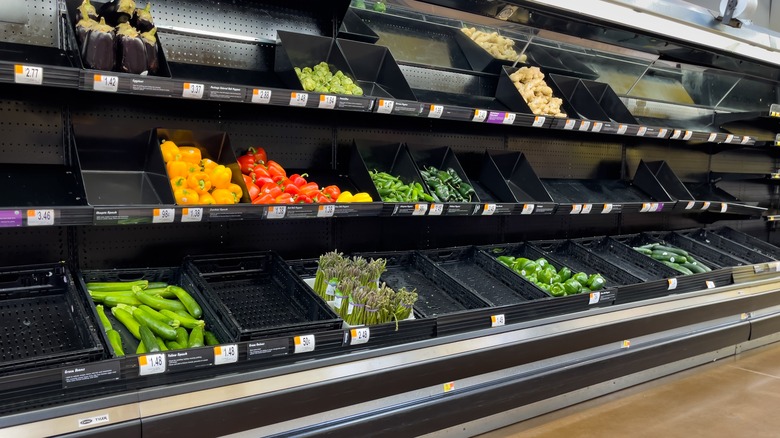12 Reasons College Students Have A Hard Time With Healthy Eating
College is a unique time in life. For many, college years come with newfound freedom, new friendships, the start of a career, and the exploration of one's self. While there are lots of positives to enjoy during these years, there are also plenty of challenges faced by college students.
People often joke about the freshman 15; first-year college students are notorious for putting on extra pounds. Gaining weight certainly isn't inherently unhealthy, but the freshman 15 are often associated with unhealthy habits like binge eating or drinking. Freshman or not, changes in college students' eating habits are nothing to joke about.
A healthy diet looks different for everyone, but generally, it involves eating adequately-portioned meals throughout the day that include nutrient-dense foods with the necessary vitamins and minerals to help our bodies stay strong and energized. Unhealthy diets might lead to unhealthy behaviors and could even end up negatively impacting mental health and academic performance.
For these reasons, it's important that college students are able to maintain healthy eating habits. If you're a college student who finds it difficult to eat healthy, be gentle with yourself! You're not alone, and there's always time to introduce healthier habits into your life. We've put together a list of common reasons why college students have a hard time eating healthily which will hopefully help you identify issues and make small changes.
1. They're too busy
While college can be a time filled with freedom and fun, it's also filled with time-consuming responsibilities. College students have a lot to cram into their schedules between long classes, schoolwork, jobs, clubs, and social activities.
Some are so busy that they can't even find the time to eat. Several Miami University students reported to the college newspaper, The Miami Student, that they don't have enough time in their day to eat or purchase food, noting that extra-long lines at dining halls caused by recent labor shortages contributed to the time spent purchasing food before classes.
In a 2018 article written for The Temple News, a Temple University student asserted that they'd sacrifice meal time for study time in order to "be successful." However, a dietician pointed out to The Miami Student that a habit of skipping meals can negatively affect students' well-being and lead to other unhealthy habits in the long run. She noted that healthy choices — like eating well and regularly — are key to being able to "perform well academically, fuel workouts, [and] participate in student life activities." Simply put, eating healthy is more likely to contribute to success than skipping meals.
Eating fortified meals throughout the day is important for students' health, whether they need to head to the dining hall earlier or carve out time to cook. Her Campus contributor Makena Gera claims they take just two hours a week to plan, grocery shop, and cook all her meals.
2. They can't afford it
College is expensive. Even with deferred student loans, college students may have to pay out of pocket for things like housing, transportation, books, and food — none of which are cheap. In fact, a 2020 study from the Hope Center reported that over 25% of students at two- and four-year colleges were affected by food insecurity.
As per Tasting Table, food insecurity is related to the accessibility of food, while the Hope Center adds that those with food insecurity struggle with uncertainty regarding their ability to access sufficiently healthy food in a "socially acceptable manner."
A number of factors may contribute to students' struggles to access or afford food, including pandemic-related financial challenges. Eating an insufficient amount of food is unhealthy on its own, but what's worse is that options like fast food and processed foods containing unhealthy ingredients are often all that students can afford to eat (via Health Affairs). Healthier, nutrient-dense food options, like fresh fruits and vegetables, may now be harder to access due to recent inflation.
Health Affairs notes that though universities are using various methods to help combat this issue for their students, accessibility is still an issue. Students might also avoid seeking help for fear of stigmatization. The health policy-focused journal suggests that unhealthy eating habits may ultimately affect a student's ability to complete their degree, making for a detrimental cycle that will hopefully be assuaged by federal action in the future.
3. There aren't enough options
College students on campus typically get most of their meals from college dining halls and on-campus eateries. Off-campus grocery stores and restaurants may be hard for students who don't have cars or struggle to access public transportation. While everybody is different, and no two people need the same nutrients or calories to remain healthy, there are some base-level guidelines to follow to maintain a healthy lifestyle. According to the Centers for Disease Control and Prevention, healthy eating focuses on fruits and vegetables, whole grains, various proteins, and lower intakes of added sugars, unhealthy fats, and salt.
While skipping one meal or indulging in junk food is completely fine in moderation, a steady intake of nutrient-dense meals is important for overall health. A 2019 study conducted at the University of California Merced found that while some students were satisfied with the amount of nutritious options available, more felt that there were an inadequate number of healthier foods on campus (via PubMed Central). Likewise, participants of the study suggested that the healthier options often cost more than the unhealthier ones.
It's also worth mentioning that some people (college students or not) are pickier when it comes to their meals. For those with a more sensitive palate or restricted preferences, it could be hard to find food options on campus that are simultaneously healthy, affordable, and enjoyable to them.
4. They're adjusting to a new lifestyle
There's a reason people say that college is one of the most transformative periods of a person's life. For many students, going off to college can mean adjusting to a completely different lifestyle as they navigate their newfound independence and responsibilities. This adjustment period can affect students' eating habits in a number of ways.
As students learn to share space with roommates, live away from their friends and family, make financial decisions for themselves, and take charge of their schedules, they may become overwhelmed and stressed, which can have negative impacts on their health. A study published in 2020 reported that many first-year college students in Australia who struggled with the transition from high school to college suffered from stress, which often led to unhealthy food choices and overeating or under-eating (via Multidisciplinary Digital Publishing Institute).
Moreover, for students who were used to eating meals prepared by parents or family, adjusting to being in control of their own diet may be difficult. Some may not know how to cook for themselves, while others may be unsure what to eat or when to eat without someone guiding them. Luckily, these students can find healthy eating tips and advice online or from resources offered by their college.
5. They aren't educated about health
Maintaining healthy eating habits is difficult without a solid understanding of what a healthy diet entails. Even with the right intentions, many college students struggle to eat healthily simply because they aren't adequately educated about healthy foods.
According to the World Health Organization, perceptions of health vary across individuals and cultures. Still, an average adult's healthy diet should include at least five portions of fruit and vegetables per day, whole grains, legumes, nuts, and a balanced intake of fats, sugars, and salt. The World Health Organization states that a healthy diet is beneficial in that it helps prevent certain diseases and allows us to obtain adequate nutrients.
Nutrition literacy relates to individuals' ability to understand and make informed decisions about nutrition, according to a study published by the Multidisciplinary Digital Publishing Institute. This study, conducted in 2021, found a relationship between college students' level of nutrition literacy and their healthy eating habits — greater nutrition literacy generally correlated with healthier eating. While factors like socioeconomic background and financial status also affect the foods college students eat, it could be beneficial for colleges to provide more accessible education regarding healthy foods and diets to help students eat more nutritious foods.
6. They can't cook
College dorms aren't exactly luxurious — most include a bed or two, a desk or two, and room for a mini fridge and a microwave. While savvy students have learned to create complete meals using just their microwaves, those who lack the time or motivation to learn to do the same are usually left eating from dining halls or restaurants.
Likewise, though many colleges offer community-style kitchens outside dorm rooms for students to use, students don't always take advantage of them. In response to the question "why don't college students cook for themselves," Quora user Myia Dickens cited that, without a dorm kitchen, it was still too "inconvenient" to use the college's community kitchen to cook, adding that it was also often in use by others or not clean.
This is important because, as reported by a South Dakota State University student in their master's thesis, cooking is related to healthier diet and eating habits. In their research, the student cited a lack of time, motivation, and general cooking skills as reasons why many college students don't cook. While eating at restaurants occasionally is enjoyable, they can be expensive and sometimes unhealthy. On the contrary, cooking at home allows for fresh, clean ingredients and meals and can help people eat more mindfully. On-campus cooking classes or college dorm cooking tips can help students feel more comfortable in the kitchen.
7. They're struggling with body image
Eating habits and body image, unfortunately, often go hand-in-hand. Insecurities about weight and appearance can lead to eating disorders or unhealthy diet or exercise habits. Why do college students struggle with body image? There are numerous factors that can contribute to negative self-perceptions and insecurities.
Recently, FOX43 reported on findings from a national survey that 88% of college students consider social media usage to negatively impact their body image. The news outlet touched upon photo editing, filters, and the generally unrealistic images that are often shared on social media, and how comparing ourselves to these unrealistic photos can lead to negative thoughts and perceptions of our bodies. Likewise, when the New York Times asked teens about these issues, many used the word "detrimental" to describe social media's effect on their body image.
Social media aside, the Child Mind Institute notes that the drastic change from high school to college creates the "perfect storm" for eating disorders to form, be it restrictive eating, binge eating, or other damaging habits. Between stress, the absence of family and friends, and general societal pressure to look attractive, college students can become fixated on their body image and develop unhealthy eating habits as a result, as per the Child Mind Institute. Luckily, there are many resources at colleges to help students struggling with eating disorders or mental health. The National Eating Disorders Association also offers an accessible helpline for support.
8. Their mental health is affecting their diet
The pressure to decide on a career path and do well in school, the desire to enjoy social activities, and potential struggles with finances are stressors that so many college students face daily — not to mention the presumed effect that the COVID-19 pandemic has had on all of them. Between the need to adapt to overwhelming change, the work loaded into their schedules, societal expectations, and financial worries, it's no wonder that college students struggle with their mental health. In fact, it seems that college students struggle with mental health more than the rest of the population.
Fortune conducted a survey earlier this year, reporting that 60% of college students are living with a diagnosed mental health condition, including anxiety, depression, eating disorders, personality disorders, and more. These findings are significant because, in the Millennium Journal of Education, Technologies, and Health, a published study confirmed that "students with a high level of stress, anxiety and more depressive symptoms tend to have unhealthy eating habits."
These unhealthy habits could be skipping meals, overeating, or overindulging in unhealthy foods to feel better (via WebMD). According to WebMD, these negative habits can further worsen mental health, affecting energy levels and mood and creating a higher risk for illness. While it may be difficult and take practice, introducing nutritious foods and more balanced eating habits can slowly improve mental health. Likewise, seeking professional help is always a step in a positive direction.
9. Alcohol consumption affects their diets
It's no secret that college years are often associated with alcohol consumption. College campuses are often the first place where students experience freedom and autonomy over their daily lives and decisions, and for many, it's hard not to abuse that freedom.
In their most current survey of undergraduate college students, the American College Health Association's National College Health Assessment found that 67.4% consumed alcohol, with 13.7% reporting that they'd consumed seven or more drinks the last time they consumed alcohol in a social setting. According to the University of Nevada, Reno, consuming four to five drinks or more within two hours can be considered binge drinking, the negative effects of which can include chronic diseases, learning problems, alcohol poisoning, and more.
Students may illegally consume or abuse alcohol due to peer pressure or mental health struggles, but either way, they may develop unhealthy eating habits. Research published in the American Society for Nutrition found that when it comes to alcohol, many students intentionally skip meals or eat less to compensate for calories and get drunk more easily, while others even forcibly purge after drinking to get rid of extra calories. All of these behaviors are unhealthy and potentially very dangerous.
10. Drug abuse affects their diets
While college students are known to consume alcohol, many also abuse illegal substances or prescription drugs. The American Addiction Centers list marijuana, psychedelic drugs, prescription stimulants, cocaine, and painkillers among the most-used drugs by college students.
Non-medical marijuana use in college students has steadily risen over the years, and research has shown that college students using marijuana are typically more likely to consume junk foods (via Forbes). While some research has shown that medical marijuana use can potentially help those with eating disorders such as anorexia or bulimia nervosa, abusing the drug can potentially lead to overeating or binge eating, as per Healthline.
As for prescription stimulants such as Adderall, there are significant impacts on eating habits. Eating disorder rehabilitation center The Meadows Ranch shares that college students may use this drug to suppress appetites and lose weight, which can lead to addiction and the development or worsening of eating disorders.
TimelyMD notes that college students have a slew of reasons to abuse drugs and substances, including stress, peer pressure, Greek life, or to cope with mental health struggles. Students should know that addiction and drug abuse can be fatal and that there are resources that can help them, including college counseling services and addiction centers.
11. Their dietary restrictions make it difficult
Eating healthy at college might be difficult due to finances, scheduling, stress, and limited dining options. Still, students with dietary restrictions might find it even harder to maintain a balanced, satisfyingly healthy diet.
Dietary restrictions amongst college students are vast, including gluten intolerance, vegan and vegetarian diets, and allergies to nuts, eggs, or other common ingredients. In 2019, the Tufts University student newspaper published an article featuring disappointing reports from students whose dining options were limited. Students with celiac disease lamented that the gluten-free food options at the university were minimal. One gluten-intolerant student even purchased an expired snack from the dining hall, stating they were forced to spend extra money on food not included in their meal plans.
Moreover, students with compounding dietary restrictions face even more dining constraints. A Tufts University student with a gluten-free and dairy-free diet reported that since gluten-free products contained dairy and dairy-free products contained gluten, they were obligated to eat the same very plain dish for most meals. Similarly, a Molloy College student reported in a blog post on Study Breaks that vegan students were mostly stuck eating only plain fruits and vegetables, which despite being nutritious, lack ample protein and leave students unsatisfied.
Lacking a sufficient variety of dining options for all of their students isn't a good move for colleges. Not only do students need ample food to support their health, but they also need a wide variety of nutrient-dense foods.
12. College meal plans don't work in their favor
In addition to tuition and housing fees, many colleges require students to purchase a meal plan. According to the Education Data Initiative, the average monthly cost of a college meal plan was $563 in 2021, with some colleges offering plans as high as $640 a month — that's over $5,000 per school year.
Every college's meal plan is different, but the average cost of $563 per month derives from colleges whose meal plans allow for an average of 12 to 15 meals per week, as per the Education Data Initiative. Three meals per day, which is considered to be a healthy amount of food, means 21 meals per week, not 12. As such, many students struggle to eat healthy because their college meal plans are too expensive and, as is usual, junk food tends to be cheaper.
A Tulane University student touched upon how meal plans that provide an insufficient amount of food can lead to disordered eating and skipping meals. The Tulane Hullabaloo student newspaper wrote that the university's "meal plan options rely on the student eating fewer than three meals a day on campus" if they don't pay for the unlimited meal plan. On the flip side, meal plans offering an unlimited amount of food can make way for overeating or binge eating, as many students might feel they need to get the biggest bang for their buck (via NBC News).












